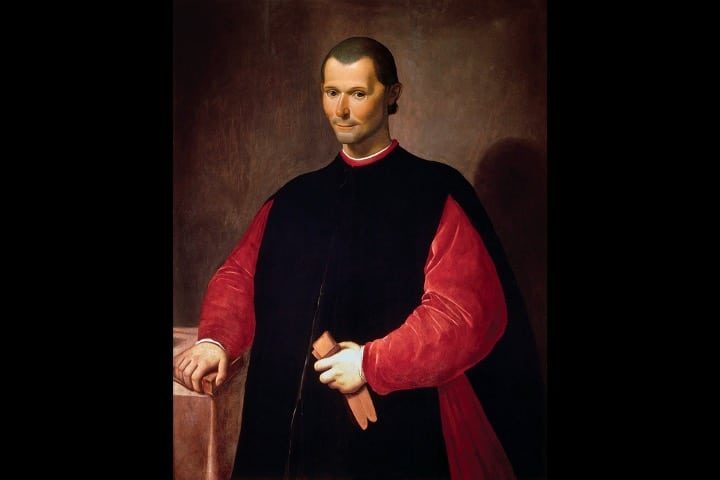
“Where the willingness is great the difficulties cannot be great.” — Niccolo Machiavelli
Born 554 years ago today, Niccolo Machiavelli (1469-1527) was an Italian philosopher, politician, and writer who is widely considered one of the most important political thinkers in Western history. Born in Florence, Italy, Machiavelli lived during a time of political upheaval and conflict in Italy, and his writings reflect the tumultuous political climate of the era.
He is best known for his influential book The Prince, published in 1532, five years after his death. In this book, Machiavelli lays out his ideas about political power and how it should be wielded, presenting various methods by which leaders can maintain their hold on power.
It is here that most people misinterpret Machiavelli. Do a Google search for “machiavelli” and you’ll find that nearly every hit returned — apart from the biographical ones — reveals that most people using his name use it incorrectly and ignorantly. I would venture a guess that most people invoking the name of Machiavelli and assigning to him a “by any means necessary” philosophy of political power have never read a single sentence written by the man, at least not one that wasn’t a gobbet taken out of context.
As did all educated people at the time, our Founding Fathers read and studied the works of Niccolo Machiavelli and recorded their impressions in their commonplace books, as well as in their letters and speeches.
All of Machiavelli’s works were included in the first Library of Congress. Jefferson, Madison, Adams, and Franklin all cited Machiavelli frequently and understood that, although being “universally damned,” he was a man whose works were “instructive, and many of our modern politicians could learn a great deal of sound reasoning” from reading them.
Our Founding Fathers recognized that Machiavelli was not advocating for ruthlessness in rulers. In fact, in his introduction to The Prince, Machiavelli himself writes that it is only through virtue and the respect and love of his people that a prince could be most comfortable on his throne. It is when rulers fail to live virtuous and respectable lives that they must turn to other means to maintain their grip on power. He describes these other tactics as a way to warn the people, to reveal to them how a republic descends from liberty to slavery under a ruthless ruler.
Despite its controversial reputation, The Prince has been widely studied and debated by scholars and political leaders over the centuries. Machiavelli’s other notable works include Discourses on Livy and The Art of War.
Judging strictly from the number of references made in the letters and speeches of the Founding Fathers, Machiavelli’s Discourses on Livy impressed itself on their minds more than The Prince.
As a service to the reader, most of whom are likely unfamiliar with the writings of Niccolo Machiavelli, I present selections from Discourses Concerning Livy and The Prince, all of which once profoundly impressed our Founding Fathers but have now been forgotten, except for the multitude of misinterpretations offered by reporters and rulers.
From Discourses on Livy:
On the Value of Studying History:
I have judged it necessary to write upon all those books of Titus Livy which, because of the malignity of the times, have been prevented (from coming to us), in order that I might judge by comparing ancient and modern events what is necessary for their better understanding, so that those who may read these Discourses of mine may be able to derive that usefulness for which the understanding of History ought to be sought.
On the Blessings of Wise Lawgivers in a Republic:
A Republic can be called fortunate which by chance has a man so prudent, who gives her laws so ordered that without having need of correcting them, she can live securely under them.
On the Relationship of Virtue and the Law:
Where something by itself works well without law, the law is not necessary: but when that good custom is lacking, the law immediately becomes necessary.
The Power of Popular Sovereignty:
The People placed in charge to guard the liberty of anyone, reasonably will take better care of it; for not being able to take it away themselves, they do not permit others to take it away.
On the Necessity of Protecting Liberty:
Among the more necessary things instituted by those who have prudently established a Republic, was to establish a guard to liberty, and according as this was well or badly place[d], that freedom endured a greater or less (period of time).
On the Necessity of an Armed Populace:
It is enough to ask somebody for his weapons without saying “I want to kill you with them,” because when you have his weapons in hand, you can satisfy your desire.
On the Difficulty of Freeing a People Accustomed to Slavery:
It is just as dangerous and difficult to free a people that wants to remain servile, as it is to enslave a people that wants to remain free.
From The Prince:
On How Leaders Should Seek Peace and Harmony Among Their People:
A prince ought also to show himself a patron of ability, and to honour the proficient in every art. At the same time he should encourage his citizens to practise their callings peaceably, both in commerce and agriculture, and in every other following.
On the Danger of Flattery:
There is no other way of guarding oneself from flatterers except letting men understand that to tell you the truth does not offend you.
When Taking Up Arms Is Justified:
That war is just which is necessary, and arms are hallowed when there is no other hope but in them.
On the Benefit of a Militia of Citizen Soldiers Over a Standing Army:
If, therefore, your illustrious house wishes to follow these remarkable men who have redeemed their country, it is necessary before all things, as a true foundation for every enterprise, to be provided with your own forces, because there can be no more faithful, truer, or better soldiers.
On How Difficult It Is to Teach the Truth to People Taught to Believe Lies:
It ought to be remembered that there is nothing more difficult to take in hand, more perilous to conduct, or more uncertain in its success, than to take the lead in the introduction of a new order of things. Because the innovator has for enemies all those who have done well under the old conditions, and lukewarm defenders in those who may do well under the new. This coolness arises partly from fear of the opponents, who have the laws on their side, and partly from the incredulity of men, who do not readily believe in new things until they have had a long experience of them.
Despite his controversial ideas and tumultuous political career, Machiavelli’s influence on the political thought of our Founding Fathers is irrefutable. His emphasis on realism and the practical exercise of power and its relationship to virtue continues to be debated and analyzed by scholars and politicians around the world.




